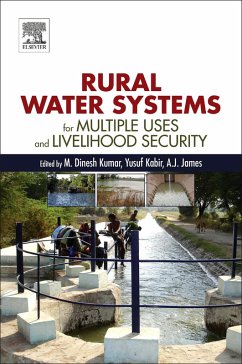Rural Water Systems for Multiple Uses and Livelihood Security covers the technological, institutional, and policy choices for building rural water supply systems that are sustainable from physical, economic, and ecological points-of-view in developing countries. While there is abundant theoretical discourse on designing village water supply schemes as multiple use systems, there is too little understanding of the type of water needs in rural households, how they vary across socio-economic and climatic settings, the extent to which these needs are met by the existing single use water supply schemes, and what mechanisms exist to take care of unmet demands.
The case studies presented in the book from different agro ecological regions quantify these benefits under different agro ecological settings, also examining the economic and environmental trade-offs in maximizing benefits. This book demonstrates how various physical and socio-economic processes alter the hydrology of tanks in rural settings, thereby affecting their performance, also including quantitative criteria that can be used to select tanks suitable for rehabilitation.
The case studies presented in the book from different agro ecological regions quantify these benefits under different agro ecological settings, also examining the economic and environmental trade-offs in maximizing benefits. This book demonstrates how various physical and socio-economic processes alter the hydrology of tanks in rural settings, thereby affecting their performance, also including quantitative criteria that can be used to select tanks suitable for rehabilitation.
- Covers interdisciplinary topics deftly interwoven in the rural context of varying geo-climatic and socioeconomic situations of people in developing areas
- Presents methodologies for quantifying the multiple water use benefits from wetlands and case studies from different agro ecologies using these methodologies to help frame appropriate policies
- Provides analysis of the climatic and socioeconomic factors responsible for changes in hydrology of multiple use wetlands in order to help target multiple use water bodies for rehabilitation
- Includes implementable models for converting single use water supply systems into multiple use systems
Dieser Download kann aus rechtlichen Gründen nur mit Rechnungsadresse in A, B, BG, CY, CZ, D, DK, EW, E, FIN, F, GR, HR, H, IRL, I, LT, L, LR, M, NL, PL, P, R, S, SLO, SK ausgeliefert werden.


